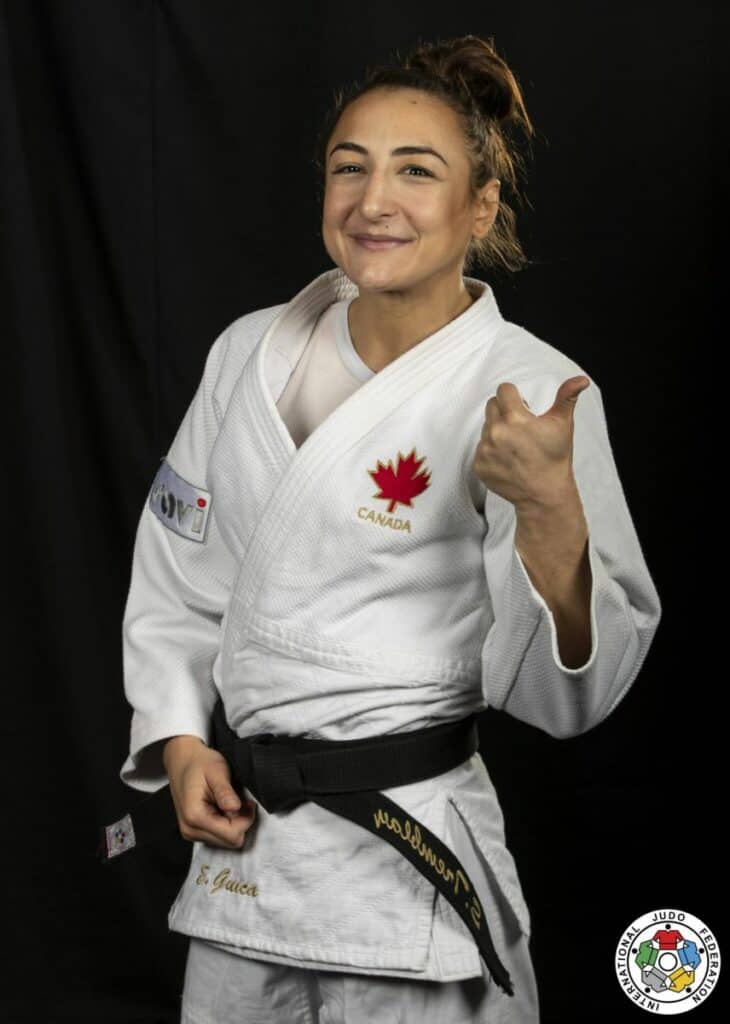Ecaterina Guica retires, but still close to the mat
Montreal March 1st, 2022—After a career of nearly 15 years on the international scene, Ecaterina Guica announced her retirement from competition last December. Hanging up her judogi does not mean that she is stepping away from her sport. On the contrary.

She has a bachelor’s degree in psychology and is pursuing her master’s degree in this field. In collaboration with Judo Canada, the new retiree will implement a project to predict performance and long-term retention.
To do so, she will try to identify the characteristics that determine the longevity of an athlete’s career using a precise analysis grid. This grid will consider various criteria such as technical and physical skills, physical condition, and the feeling of belonging to one’s training group.
“Yes, results are important in judo, but since it’s a sport where you have to train with partners, it’s also important to encourage those who don’t do as well when they are young,” Guica believes. “They have great perseverance and resilience. Maybe right now they don’t have the best results, except that they are promising people because of their personal characteristics, and we can pay attention to them.”
The idea for the research partnership came from a discussion between her and Marie-Hélène Chisholm, Judo Canada’s high-performance manager and also a former judoka. Guica shared her concept with her and was invited to officially submit her project to the national federation.
“They agreed and I will be following a group of 16 youths. Some of them were my training partners during the pandemic. I think it’s really cool because it allows me to stay in judo” adds the former Concordia University student who is now pursuing her master’s degree with an internship at Yorkville University.
A presence at all major tournaments
During her years on the national team, the 28-year-old Quebecer participated in the Rio (2016) and Tokyo (2021) Olympic Games, the Pan-American Games (Toronto 2015), as well as the Youth Olympic Games (Singapore, 2010), not to mention several editions of the World and Pan-American Championships.
She won the silver medal at the Pan-American Games in 2015 and gold at the Continental Championships in 2020.
Ecaterina’s fondest memory of competition remains Canada’s victory in the team competition at the 2015 Pan American Championships.
“It was (coach) Jeremy Le Bris’s last competition and it was the first time we won the team competition. The whole day was really cool. It’s always more fun to win as a team. The Pan Am Games in Toronto was also really cool, as were my Olympics and Youth Olympics.”
The athlete, who grew up in La Prairie, Quebec, was involved in judo as a child, a teenager and during the beginning of her adult life. It is with the same energy that she is about to dive into her new challenge.
“I had ambition and perseverance, but it had also become a habit. I didn’t question it anymore. I developed my work ethic and resilience, especially after my many injuries. Yes, (this career in judo) was worth it!” concludes Ecaterina, who would like, one day, work in sports psychology.
-30-
Information:
Patrick Esparbès
COO
Judo Canada
(514) 668-6279
p.esparbes@judocanada.org
